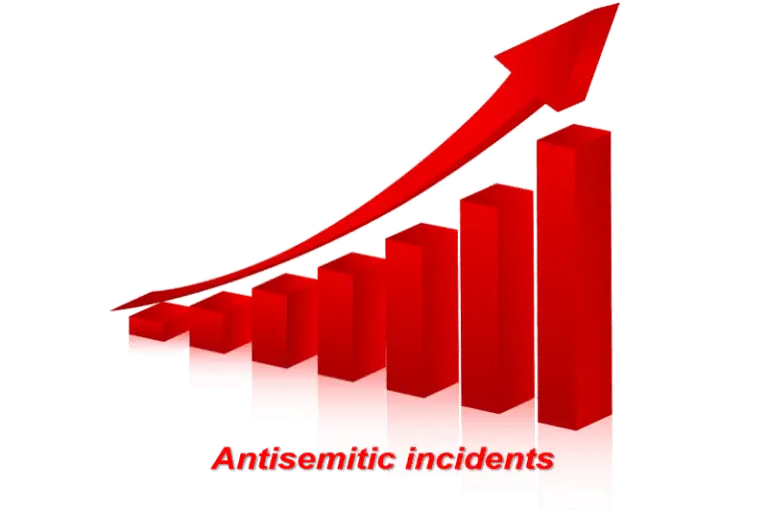The most encouraging statistic this year was that for the first time in a number of years, there were no casualties that resulted from antisemitic attacks in the diaspora. However, this does not mean the attacks have ceased; only that some of them were foiled, and that those which were carried out resulted in injuries which at times were severe.
In general, we can note the continuation of trends observed in recent years: the extreme right and Islamic extremism continue to constitute the most serious and immediate threat to Jewish communities around the world. At the same time, a large portion of Jewish communities also see the extreme left as growing risk factor, albeit of lesser severity.
The Covid-19 epidemic was the most prominent factor behind antisemitic trends in 2020. On the one hand, the repeated lockdowns seem to have lowered physical friction between different populations and the implications of the pandemic on every aspect of life dominated the agenda, pushing other topics, such as the migration crisis which dominates the extreme right’s agenda, off to the side; resulting in a lower number of physical antisemitic attacks this year. While on the other hand, online antisemitic activity evolved and grew; setting new precedents for online hate speech enrollment and distribution. At the very beginning of the pandemic’s outbreak, our monitoring center identified attempts by known antisemitic advocates to draw a connection between Jews and Israel to various aspects of the pandemic. At first, these attempts were limited to clusters of antisemitic activists. As the crisis deepened, the frequency and volume of these libels rose and reached its peak during what appears to have been an orchestrated Iranian campaign that reached millions of Twitter users and compared the state of Israel to the coronavirus.
Simultaneously, we identified a massive increase in consumption of conspiracy theories claiming that Jews sought to profit from the virus from the pharmaceutical industry, that Jews were disproportionately responsible for spreading the virus, or that Jews are using the virus to create a New World Order that will tighten their grasp over world economies. Anti-vaxxers wore yellow stars in demonstrations and posted them to their social media profiles; comparing coronavirus restrictions to the Nazi restrictions placed against Jews during the Holocaust while claiming they were being led to the vaccine “like sheep to the slaughter.”
The reaction from social media platforms to the phenomenon of online hate speech during the pandemic was partial and insufficient, and suffered from a lack of transparency and deterrence. Action came only after unprecedented public and political outcry from governments and NGOs, and still the reaction was partial. Facebook and Google announced they would ban content that denies the Holocaust and would close the accounts of convicted antisemites. The move targeted antisemitic accounts that have been active for years with hundreds of thousands of followers and decreased the appearance of classic antisemitism on those platforms. Twitter did not adopt such a policy and although it removes some antisemitic content, it still allows public figures such as the Iranian Supreme Leader, Khamenei, to spread antisemitism, Holocaust denial, and conspiracy theories on its platform, and refuses to close channels of convicted antisemites. On instant messaging platforms or boards the situation is even worse: far-right activists, pushed out of the mainstream platforms, have joined these alternative networks in mass numbers; creating a toxic environment in which they continue to incite violence without intervention.
In the United States, against the backdrop of political and social division, extreme groups gained prominence. The large Jewish community is awakening to a reality that more closely resembles the situation in Europe. Nine out of ten American Jews think that antisemitism is a problem in the United States, and eight out of every ten think it has increased in the last five years. White supremacists, defined by Homeland Security as “a persistent and lethal threat,” represent the most serious danger to American Jews. Alongside this threat, there is “street bullying” antisemitism that targets visibly identifiable Jews based on their appearance—making ultra-Orthodox Jews the primary target, Muslim antisemitism propagated by both the Nation of Islam, which spreads antisemitism alongside the theory of Black superiority, extreme religious preachers stemming from the Middle East, and left-wing antisemitism which correlates with new antisemitism and is influenced by the “intersectionality theory,” which connects phenomena such as the killing of George Floyd with the State of Israel. Without intervention in the coming year, social tensions can be expected to continue to pose a serious threat. Right-wing extremists will persist in depicting Jews as part of the social elite who promote a social and political order opposed to theirs. At the same time, radical left-wing movements will likely continue to see Jews as a privileged minority that does not belong to their political camp due to their socio-economic status and their connection with the State of Israel.
In western Europe, for the first time in decades, there is an institutional threat to Jewish life: in the name of animal rights and reducing animal suffering, the European Court of Justice has enabled its member states to demand the stunning of animals before ritual slaughter (Jewish or Muslim) while continuing to allow hunting. This severe restriction, and the fear of further constraints of this kind, such as the prohibition of circumcision, do not bode well for the future of Jews in Europe regardless of whether such prohibitions are officially legislated, the very discourse regarding such topics and the decision taken by the supreme court, socially stigmatizes Jewish practices as backwards and cruel, and harms the fabric of Jewish life in the Diaspora.
In France, radical Islam continues to constitute a major threat. The events surrounding the murder of school teacher Samuel Paty, and the heightened level of security Jewish communities have been placed under as a result, demonstrates how exposed the French Jewish community is to threats of Islamic extremism even when the matter at hand has no direct relevance to the Jewish community.
In Britain, a report by the Equality and Human Rights Commission justified the sense of discrimination and frustration felt by many Jewish members and voters of the Labour Party. The report found that under Jeremy Corbyn’s leadership, the Labour Party was guilty of three violations of the Equality Act and fostered “a culture within the Party which, at best, did not do enough to prevent antisemitism and, at worst, could be seen to accept it.” Though Corbyn was subsequently suspended from the Labour Party following the report’s publication, he has lamentably been readmitted.
Germany will be celebrating 1,700 years of Jewish life in the country this year. Yet despite the festivities, the threat posed to the German Jewish community by the extreme-right and radical Islamism continues to grow. In addition, there is a growing trend in German public opinion calling to put an expiration date to the moral debt owed to the Jews and the State of Israel. Among the right-wing scene, this trend is characterized by a trivialization of the Holocaust and a longing for the past combined with the sentiment of “being fed up” of making amends for the Holocaust. Among left-wing circles, this trend is characterized mainly by the call to repeal the decision to adapt the IHRA definition for antisemitism.
In Eastern Europe, the attempts to strengthen national sentiment, noted in previous years, continues. This process often involves historical revisionism and the commending of local patriots who were involved in the persecution and murder of Jews, both before and during the Holocaust. In addition, other attempts are being made to reframe national history and shift the blame for the persecution of Jews onto the victims, who are depicted as “supporters or executers of Communism,” or blamed for “supporting the Nazi war machine” by working as forced slave labor. Nonetheless, this year there were successful attempts by authorities to prevent the dissemination of conspiracy theories online connecting Jews and the coronavirus, and potentially volatile events were treated with sensitivity which prevented possible escalation.
Alongside these events, there were many accomplishments this year in the struggle against antisemitism. Some of the most prominent among them was the continued ratification of the IHRA working definition of antisemitism as the international standard for defining the phenomenon worldwide. Three states with Muslim majority populations also adopted the definition. Among them, for the first time, was also an Arab country, Bahrain. In Morocco, a new curriculum for primary schools has been launched which includes chapters about the history of Jews in Morocco and Moroccan-Jewish culture. In the United States, the position of Special Envoy for Monitoring and Combatting Antisemitism was promoted to that equivalent of an ambassador. Other countries, among them Holland and Canada, also decided to appoint special envoys to combat antisemitism, while the European Union decided to include the struggle against antisemitism as part of the Union’s core policies.
To sum up, 2020 was an anomaly in Antisemitic trends. At the time of writing, it is not yet clear how the vaccination project will be carried out and how fast and effective the recovery process will be. If the process becomes protracted, there is reason to fear this will deepen the political and economic crisis and further exacerbate existing social divisions while strengthening radical and populist elements from across the political spectrum. These groups will likely once more try to blame their own shortcomings on a global conspiracy or some demonic “other.”
These matters, and more, are analyzed in greater detail in the report you find before you.





